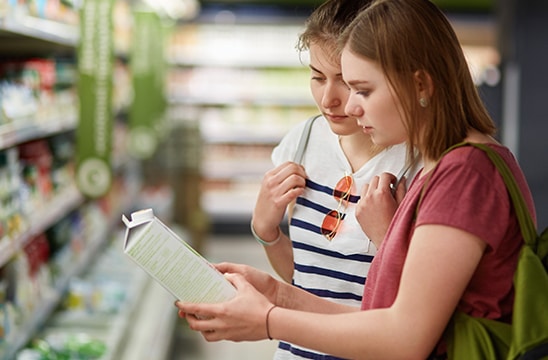Key Takeaways
- The global market for alternative proteins is projected to reach US$36.61 billion by 2029, which is an anticipated CAGR between 10-25% depending on various factors during the forecast period of 2022-2029
- 必威体育赛事投注55% of consumers are more likely to purchase sustainable food products, according to a Cargill's global FATitudesTM survey
- Rigorous testing of alternative foods & proteins is a necessity going forwards as the market evolves to create safer, healthier, and more sustainable options


What are alternative proteins?
Alternative proteins are foods, ingredients or beverages that provide all or a substantial amount of protein from non-animal sources.Quite often, these can be plant-based proteins, cell culture-based or fermentation-based proteins, or even a hybrid of plant and cell-cultured sources.
In 2020, the global market for alternative proteins was estimated at US$2.8 billion.1Most recent figures suggest that it is projected to reach US$36.6 billion by 2029, an anticipated CARG of 12.4% during the period of 2022-29.2
Consumer-behaviors influencing the market

必威体育赛事投注Results from the latest Cargill's global FATitudesTM survey highlight that 55% of consumers are more likely to purchase sustainable food products.3Reportedly, factors such as "sustainably sourced" and "conservation of natural resources" outranked other considerations like ‘Fair Trade' and ‘reduced packaging' choices for example in most countries that participated.3
必威体育赛事投注Alternative protein food and beverage products are often marketed as a more sustainable option for consumers who prioritize factors such as climate change, animal rights, and human wellbeing in their purchasing choices.
Known potential consumer-behaviors that influence the food market include:

Environmental sustainability
Limiting greenhouse gas emissions (GHG) from livestock-rearing & agriculture required to produce meat & dairy, which contributes towards climate change.The United Nations highlights that global livestock rearing is responsible for 14.5% of GHG emissions,4which surpasses that of transportation emissions.5Furthermore, a 2021studyfound that the use of animals as a food source (including cows and pigs), as well as livestock feed, is responsible for 57% of all food production emissions.Whereas the research identified only 29% coming from the cultivation of plant-based foods in comparison.6必威体育赛事投注Conversely, if we examine some of the causes of deforestation alone, reports also find that agriculture of non-meat products, such as soya farming, are also to some degree contributing towards climate change due to their higher demand from food and beverage manufacturers for the consumer market.7

Health and well-being
必威体育赛事投注Many consumers are concerned about veterinary drugs, hormones, and other contaminants in meat-based products so are more inclined to purchase alternative protein-based products instead, which they may feel is a healthier option.必威体育赛事投注Additionally, some consumers have made conscious efforts to reduce their meat consumption – particularly processed and red meats – based on scientific research linking high and regular consumption of such products to increased risks of certain diseases.8,9

Protection of food safety and prevention of fraud
必威体育赛事投注Due to opportunist food and beverage fraudsters, it can sometimes be challenging for honest manufacturers to guarantee the precise contents of their products.必威体育赛事投注This issue spans the food and beverage industry and there is no exception for processed meat products: consumers are at the mercy of accurate product labeling.Cases like the2013 horsemeat scandal必威体育赛事投注could have encouraged regular meat eaters to shift towards alternative protein products at mealtimes.
Sustainable and diverse food sources
The globalization of food supply chains incurs a vulnerability to the system as numerous countries rely on imported foods to nourish their local populations on a mass scale.Over the past 2 ½ years, certain world events have triggered disruptions across different continents within the global food supply chain, such as the COVID-19 pandemic and the more recent conflict in Ukraine, which in turn impacts trading prices and food availability.
Factors like these have prompted other countries to restrict certain export foods for securing their domestic supply, which is likely to impose detrimental effects on other countries who are net importers, especially those who are less economically developed.

Where feasible, net food importer countries are investing in strengthening local food security.For example, Singapore currently imports ~90% of its food and is ramping up its local food production, with a target of producing 30% of its nutritional needs locally by 2030, known as its "30 by 30" goal.10Local government-funded R&D programs, such asA*STAR'sSingapore Institute of Food and Biotechnology Innovation (SIFBI), are developing animal-free technologies to grow cells as sources of alternative proteins in hope of achieving the country's target.10
To generate sustainable and diverse food sources, some of the largest investments in the alternative proteins market currently stem from North America.For instance, more than 40% of fermentation-based alternate proteins manufacturing companies are based in the U.S.A, followed next by Europe with 28%, then Israel with 17%.11
Global investment highlights in the alternative proteins market

Between 2010-2021, American-based companies dominated the alternative protein market overall in terms of capital investments.For example, companies like Beyond Meat, Nature's Fynd, and Perfect Day saw several hundred million dollars invested in plant-based & fermentation-based alternative proteins.12

From H1 2021 to H2 2022, Israel's alternative protein industry increased by 160%.13必威体育赛事投注One of Israel's biggest investments this year came from a local startup called Redefined Meat – a manufacturer of 3-D -printed plant-based products.The company has invested $135 million to fund production in Israel as well as the Netherlands and explore more global restaurant partnership opportunities.14

Leading the way forwards in Europe, the Netherlands government recently announced a EUR 60 million investment into local cellular agriculture producing cultivated meats.15The institution also highlighting further plans to invest between EUR 252-382 million in the alternative proteins sector over several upcoming years with funding secured by a new consortium called Cellular Agriculture Netherlands, comprising 12 organizations across academia, NPOs, and private companies.15
Safeguarding the food & beverage industry
Rising concerns on food security, food availability and climate change have translated into the progressive acceptance and adoption of alternative proteins in many parts of the world.必威体育赛事投注However, novel products may face potential challenges including food safety issues.In some markets, the demand of alternative proteins has soared tremendously while supply fell short, leading to food fraud – where some commodities such as wheat or soya that have been recognized as food allergens may be used to substitute more expensive plant-based proteins. The other types of common food fraud include concealment, counterfeit, and mislabelling.
Alternative protein testing in foods
必威体育登录手机Agilent's workflow solutions, designed for the food and beverages industry, are a one-stop shop for testing alternative protein products to validate their authenticity, nutritional information, and safety for the consumer market.
In onestudy必威体育登录手机, Agilent's LC-Q-TOF-MS/MS technology – a 1290 Infinity Series liquid chromatograph coupled with a 6550 iFunnel Q–TOF LC/MS device – was used to investigate specific non-meat proteins and peptide markers used as meat substitutes in the production of ready-to-cook beef burgers.16
Research必威体育登录手机conducted by a team of scientists showcases an untargeted GC/MSbased metabolomics approach that teases out differences between the chemical profiles of a popular plantbased meat alternative and grass-fed ground beef with similar nutritional profiles using an Agilent 7890 gas chromatograph (GC) system coupled to an Agilent 5977 GC/MSD.
必威体育赛事投注Furthermore, research shows that elemental analysis of novel cultured meat products, as well as vegetable proteins, can be achieved throughatomic spectroscopy.必威体育赛事投注Due to the process preparation of plant-based and cell-based alternative protein products for the consumer market, there is potential for some elemental metals to cross contaminate the final products that are destined for supermarket shelves.必威体育登录手机Agilent's atomic spectroscopy instruments, such as the 7850 inductively coupled plasma mass spectrometry (ICP-MS), enables end-users to identify and quantify metal elements of interest in alternative protein product samples.
For companies looking to develop cell-based foods, optimizing the field of proteins and amino acids in a bioreactor is critical but also knowing when and at what stage to pause the reaction is important.In thisapplication note必威体育登录手机, the Agilent Infinity II Prime online LC allows automated online sampling from the bioreactor to analyze growth parameters includingamino acidsand organic acids to study the reaction rate to optimize the protein yield in the reactor.
Robust testing tools to support your lab
Advancing research into alternative proteins for the food and beverages industry will no doubt influence our global food supply chain and shape the future of our foods.Whether your lab is testing cell or plant-based meats, technologies such as ICP-MS, triple quadrupole (QQQ) liquid or gas chromatography mass spectrometry (LC/GC/MS), or high-performance liquid chromatography (HPLC) are recommended by experts for robust testing purposes.
Find out more
- 必威体育登录手机Agilent ICP-MS
- 必威体育登录手机Agilent LC/MS
- 必威体育登录手机Agilent GC/MS
- 必威体育登录手机Agilent LC/Q-TOF
- 必威体育登录手机Agilent HPLC
- 必威体育登录手机Agilent Online LC